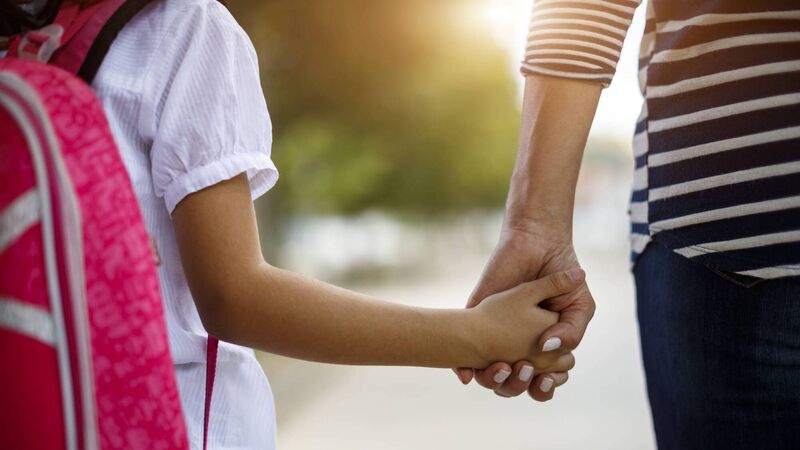Colman Noctor: Helping kids cope with an uncertain winter

Helping kids to cope at an uncertain time.
Children, like us all, are facing into an uncertain winter.
Like any other year, they’ll get flus and bugs, and everyone around them will wonder: is this just a heavy cold — or something worse? Some children will have to go for Covid-19 tests.
So how do we prepare them for what’s set to be a tricky few months? And how can we make them feel safe, when we maybe don’t feel safe ourselves?
Child psychotherapist Dr Colman Noctor says we need to take great care around how we communicate with children about coronavirus.
“We have to be very careful around saying they’re vectors or carriers — that’s an unhelpful message sinking through,” he says, citing the experience of a friend who brought her child to gymnastics class.
“When she asked him how he got on, he said they had to get their temperature checked and ‘if you cough, you’re banned for three weeks’.”
This kind of messaging, he says, comes from adult anxiety. And, while fear is an effective way of changing behaviour — ‘if you don’t wash your hands, you’ll get infected’ — it doesn’t create understanding.
“We need to create a different narrative for ourselves and our children: that these precautions are about keeping us safe.”
During the first week of schools going back, Dr Noctor’s son came home with a temperature. “We had to bring him to the GP who said he’d need to get tested for Covid. My other two couldn’t go into school either, so all three were off for three days.”
With such scenarios set to be replicated endlessly across Ireland this winter, Dr Noctor says it really is best to anticipate the school/work rhythm will be disrupted and broken up.
“If all the kids are off for four days, a parent’s going to feel trapped, particularly if they’re working. Their anxiety may not be ‘he’s got Covid-19’ but ‘how am I going to manage with all of them off school?’ And children pick up on parental anxiety, but they may not interpret it correctly.”
So the best thing, he says, is to say to children: we have to expect a bit of disruption, but whatever happens we’ll manage it. “It’s about containing our own anxiety so that the disruption becomes something that just happens — and we’re less hysterical, the atmosphere less histrionic around it.”
During this time of acclimatisation to a Covid-19 world, Dr Noctor recommends encouraging children to keep up with whatever extracurricular activities they can. Mindful there’ll be a lot of unstructured abnormality to this winter, he urges parents to aim for as much structure as possible.
“And just as adults, going out for a meal and having to do all the safety stuff, will wonder is it worth the hassle, children will too. If an activity’s overly cumbersome — temperature checks at the start and at the end — if the fun goes, if it’s anxiety-provoking, children will become disinterested and say they don’t want to go. So it’s about striking a balance between being safe and not complacent, but not petrifying children either.”
Of course, over time we’ll get used to our changed circumstances. While keeping safe, we’ll be less hyper-vigilant. “We’ll get used, for example, to wearing the face mask, to bringing it with us automatically.” And yet this is sad too, Dr Noctor says, because it’s not a normal we’ll ever want.

“The message to get across to children is that this is the ‘new abnormal’, that it’s not normal to interact in this way, to only see someone’s face and eyes, to be afraid of proximity, to not be able to engage in touch or shake someone’s hand. We need to convey to children that this is necessary and important now, but it’s not going to be forever. Explaining it’s transitory, yet we still buy in, takes away the hopelessness of ‘the old days are gone’.”
Going for testing, Dr Noctor’s son was quite excited. “The other two wanted a test as well, though when they saw it, they didn’t!” he says, adding that he took care to couch explanations about the test in positive terms. “We explained it was to rule something out, not to rule something in. We told him we didn’t believe he had Covid, but we wanted to make sure, so he could go back to school — it was a means to an end rather than a gateway to bad news.”
He advocates open, honest communication all the way with kids. “Explain ahead that the tester will wear a mask, that they’ll have a visor. Make it as familiar as possible. Having it done in your car reduces anxiety. Avoid playing it down too much though — this is like dismissing their anxiety. Instead, validate their concern, let them speak about it, voice it. And then reassure them.”
He also advises parents to shelter their children as much as possible from reminders of the coronavirus threat. “The more vigilant we are around second surges and localised lockdowns and daily numbers, the more there’s constant reminder of threat, more than is necessary. It’s important to maintain our spirits, and those of our children, even when things are grim.”
He thinks parents will feel varying degrees of embarrassment if theirs is the first family in the school to have to get Covid-tested. “My lad had been on a play-date the day before, so I had to make that phone call. And no matter how much you know this isn’t your fault, you still feel desperately responsible for the disruption it’ll cause another family. You know you’re going to create anxiety for that family.”
But at the end of the day, we need to ditch the embarrassment and maintain an attitude of encouragement — towards ourselves and our children.
“We’re doing our best. All we can do is manage things as they’re happening. We can minimise risk but we can’t eliminate it. These are unpredictable times. We’re not going to nail it all the time. But maybe we’re not failing at everything, maybe we’re surviving it. We need to tell our children this.”





